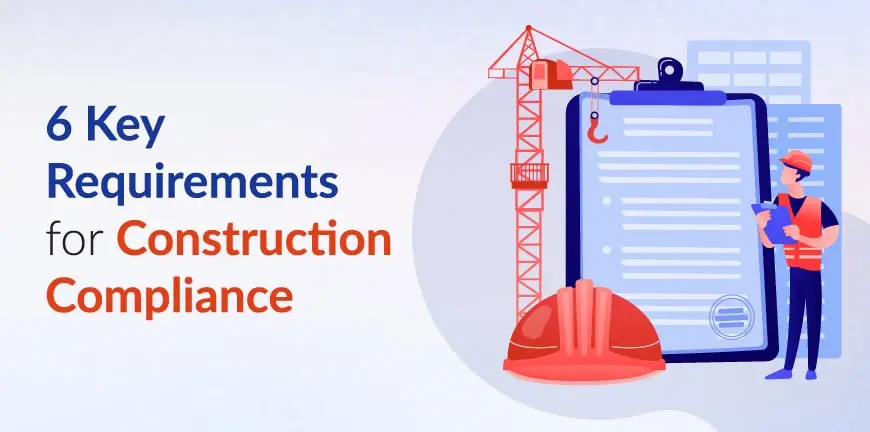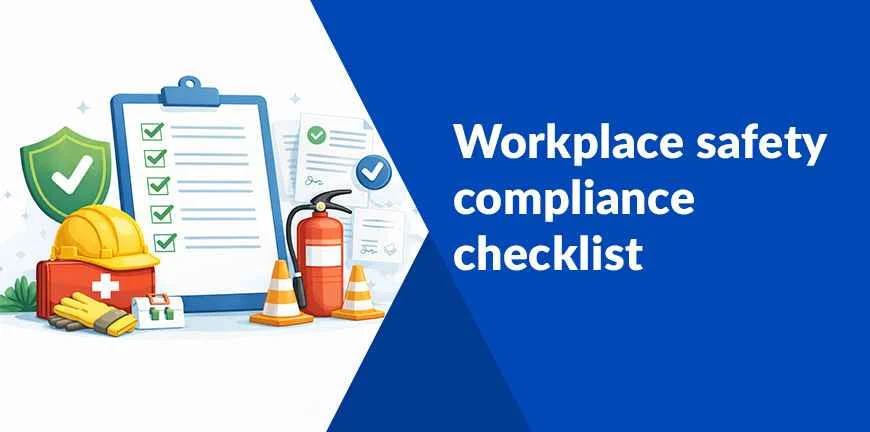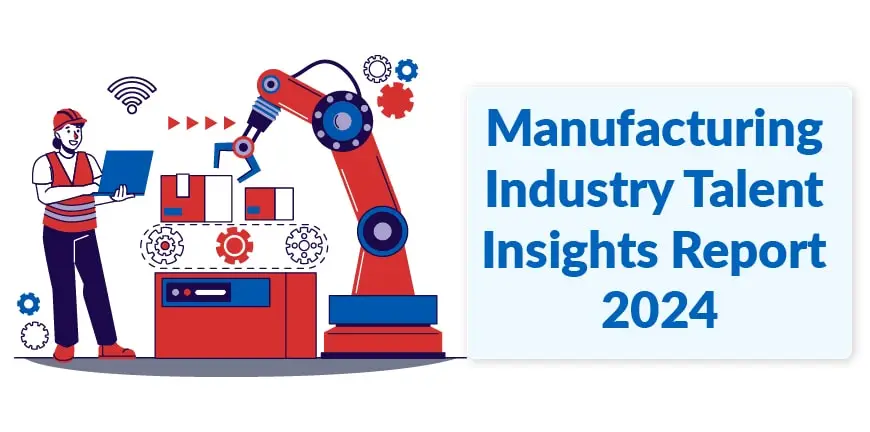
Manufacturing Industry Talent Insights Report 2024
26/06/2024
The State of the Quick-Commerce Space in India and What to Expect in the Future
27/06/2024Construction is a risky business, especially if you are just venturing into it as a subcontractor and you do not have too much idea of the compliance you must follow for the industry. And construction compliance requirements include not just statutory compliance but regulatory compliance too.
This means not only following government labor law guidelines but also the ISO and healthy, safety and environment (HSE) standards. In this blog, we will consider the various aspects of construction compliance, beginning with its importance, and then discussing the types of construction compliance and the construction compliance checklist itself.
The Importance of Compliance in Construction
By maintaining strict quality compliance, construction companies can ensure
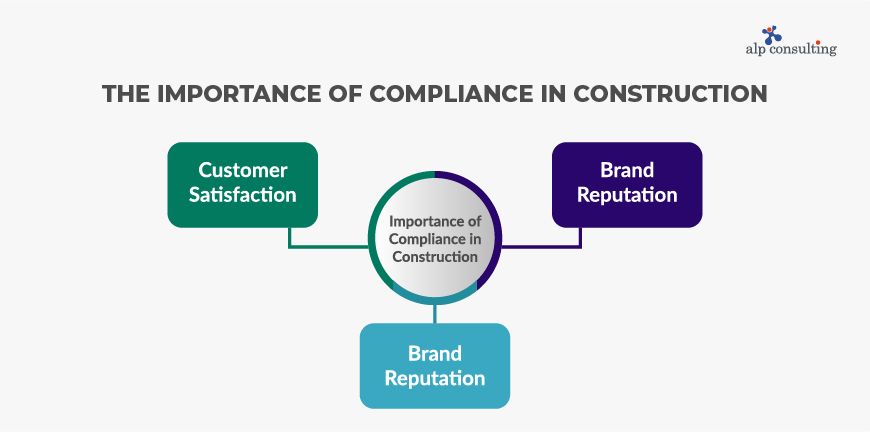
1. Customer Satisfaction
When all necessary provisions are made and measures taken during the process of construction up until handover, customers will be happy. Customers today are also concerned about worker safety and if proper health and hygiene was maintained for workers at the site.
2. Longevity of Structures
When construction company compliance is followed, structures built in this manner will be more robust and stand the test of time. This will ensure that you do not have to pay any legal fines.
3. Brand Reputation
The reputation of the construction company and others involved in the project also improves with better compliance. This is because all those many satisfied customers and happy workers will let others know it was great availing your service or working with you.
What Is Regulatory Compliance in Construction?
Regulatory compliance in construction involves a construction company standing by the rules specified by regulatory bodies, which may be governmental or non-governmental. These regulatory bodies will specify rules that impact work conditions, safety measures, and the use of specific materials for construction too.
6 Types of Construction Compliance Requirements
Construction company compliance is of the following types.
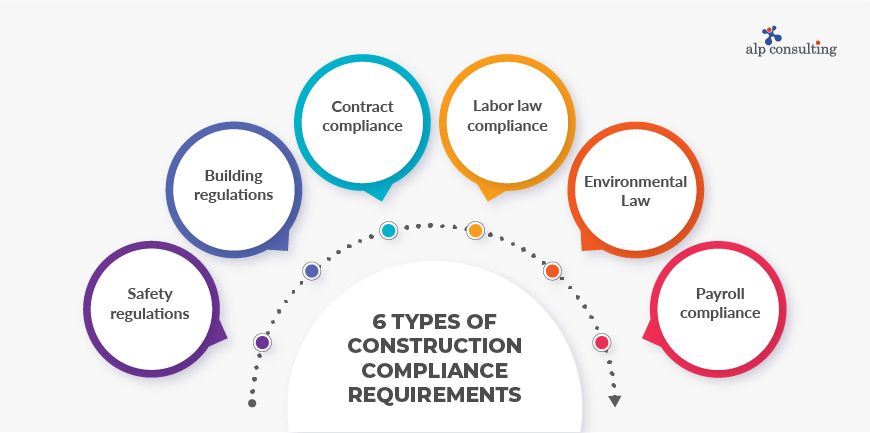
1. Safety regulations
Make sure that the safety protocols are being followed on site. The safety protocols must be documented and preserved too.
2. Building regulations
Make sure the building regulations imposed by government and non-government bodies are followed. This will ensure that the building and site are safe for continued construction.
3. Contract compliance
Make sure that the terms of the contract signed before the construction began are being followed without any exceptions. This will prevent any legal complications.
4. Labor law compliance
Your workers, supervisors, and managers need to be paid on time and the right wages, to ensure labor law compliance. The working conditions must be excellent and the work timings apt. Everyone must be provided with the right benefits too.
5. Environmental Law
Environmental law is very important, given that sustainability is evolving into a much-needed part of the future workplace, regardless of the space. Since modern construction is also about how green spaces can be integrated into living spaces rather than eliminated, environmental complaince assumes an important position.
6. Payroll compliance
Payroll compliance is another part of construction compliance that must be addressed. To make sure that the workers are paid on time, the payroll information is correct and that the salaries are accurate, it is necessary to have payroll audits too.
Compliance Risks in Construction
There are several risks of non-compliance in construction. It starts with problems in the facilities before the construction, such as on the site, extending to problems with equipment during construction, falls, electrical hazards and others. To avoid these things from happening, you need a construction compliance checklist that you can always follow. This checklist will serve as a guide for you, the sub-contractor, as you manage construction on the site, ensuring the happiness and safety of your workers.
Construction Compliance Checklist
This is a summary of a construction compliance checklist. Typically, a construction compliance checklist that covers all these points in greater detail, detailing the construction compliance requirements and would have to be prepared by your construction compliance partner.
- Provide personal protective equipment (PPE) as per the personal safety checklist, which also includes guidelines on how they must be used.
- Equipment training must be comprehensive even for experienced people. This helps reduce the possibility of accidents on the site.
- Conduct site inspections regularly to identify ongoing problems, document how they are being solved and what is the result of such solutions and to see if they pose a threat to workers.
- Protecting and preserving the environment is also important. Train your workers on how to safely dispose of waste and take measures to reduce pollution at the site.
- Site safety planning must be done to ensure that the site itself does not pose any health risks to workers. For this purpose, the layout of the site, what it consists of, and other facilities that it has must be considered.
- Labor laws must be followed. This includes accurate minimum wages paid to workers, proper work timings and healthy, hygienic and safe work conditions and concessions and benefits provided to women who are working.
- A compliance audit must be conducted regularly to ensure that the construction compliance requirements checklist is being followed.
- Gather feedback from the workers and other personnel on the site to keep improving the construction compliance checklist.
Do You Need a Construction Compliance Partner?
Construction compliance requirements need careful planning and execution, and utmost care must be taken in documentation as well. A compliance audit must be conducted once a month at least to ensure that the processes are safe and that the workers are aware of the dangers and how to cope with them. It also helps understand the impact that the construction is having on the environment and what can be done to mitigate the risks.
Managing construction compliance requirements all by yourself can be difficult, especially when you arrive at differing conclusions every time you read the rules and regulations in effect. Are you looking for a construction compliance partner? Please talk to us, and we will help you with your concerns. We can manage all the labor law compliance in construction for you, ensuring your workers feel satisfied, happy and safe.
Contact Us For Business Enquiry

Hariharan Iyer
Hariharan Iyer is the Vice President – Operations at ALP Consulting, bringing over 40+ years of experience in HR outsourcing and labour law compliance. He leads end-to-end HRO operations, ensuring process efficiency, statutory compliance, and seamless service delivery for clients across industries. With a strong background in labour law governance and workforce management, Hariharan plays a key role in driving operational excellence and compliance-led HR solutions at ALP Consulting.

